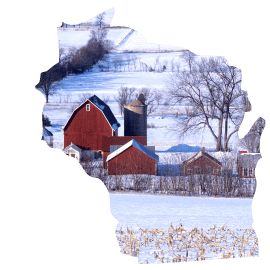Middle School Content Knowledge: Wisconsin
Secondary Teacher Preparation Policy
Analysis of Wisconsin's policies
Content Test Requirements: Wisconsin offers an "elementary and middle school" license, which allows teachers to instruct students in grades K-9.The state also offers a "middle and high school" license, which allows teachers to instruct students in grades 4-12.
Under Wisconsin's new licensing structure, candidates for the state's Tier II license (which is the state's initial license) have the
following options for demonstrating content knowledge:
- A cumulative GPA of 3.0 or higher in the subject area;
- A passing score on a standardized test; or
- Complete a content-based portfolio.
Middle School Licensure Deficiencies: Because middle school licensure deficiencies are scored in "Middle School Licensure Deficiencies," it is not considered as part of the score for the Middle School Content Knowledge goal.
Provisional and Emergency Licensure: Because provisional and emergency licensure requirements are scored in Provisional and Emergency Licensure , only the test requirements for the state's initial license are considered as part of this goal.
Recommendations for Wisconsin
Require content testing in all core areas.
Wisconsin should require subject-matter testing for all middle school teacher candidates in every core academic area they intend to teach as a condition of initial licensure. The state should set its passing scores to reflect high levels of performance to ensure meaningful middle school content tests.
State response to our analysis
Wisconsin recognized the factual accuracy of this analysis.
Updated: February 2020
Select another topic
Teacher Preparation
- Program Entry
- Teacher Shortages and Surpluses
- Program Performance Measures
- Program Reporting Requirements
- Student Teaching/Clinical Practice
Elementary Teacher Preparation
Secondary Teacher Preparation
- Middle School Content Knowledge
- Middle School Licensure Requirements
- Secondary Content Knowledge
- Secondary Licensure Requirements
Special Education Teacher Preparation
Alternate Routes
Teacher Diversity
Hiring
Teacher and Principal Evaluation
Teacher Compensation
Early Childhood Preparation
Retaining Effective Teachers
How we graded
3A: Middle School Content Knowledge
- Content Tests: The state should require that all new middle school teachers pass a separately scored subject-matter test in every core academic area for which they are licensed to teach.
The total goal score is earned based on the following:
- Full credit: The state can earn full credit if it offers a middle school license and requires teachers to pass a licensing test in every core academic area in which they are licensed to teach.
- One-quarter credit: In some cases, a state can earn one-quarter of a credit for mitigating the negative aspects of a K-8 license, for example, requiring a single subject test to teach that subject at the middle school level.
- 0/0 credit: The state will not earn any credit if it only offers a K-8 license and only requires an elementary content test.
Research rationale
Middle school grades are critical years of schooling. It is in these years that far too many students fall through the cracks. However, requirements for the preparation and licensure of middle school teachers can be especially problematic. States need to distinguish the knowledge and skills needed by middle school teachers from those needed by an elementary teacher. Whether teaching a single subject in a departmentalized setting or teaching multiple subjects in a self-contained setting, middle school teachers must be able to teach significantly more advanced content than elementary teachers. In order to do so, middle school teachers must be deeply knowledgeable about every subject they will be licensed to teach, and able to pass a licensing test in every core subject to demonstrate this knowledge.[1] The notion that someone should be identically prepared to teach first grade or eighth grade mathematics seems ridiculous, but states that license teachers on a K-8 generalist certificate essentially endorse this idea.
[1] For additional research on the importance of subject matter knowledge, see: Dee, T. S., & Cohodes, S. R. (2008). Out-of-field teachers and student achievement: Evidence from matched-pairs comparisons. Public Finance Review, 36(1), 7-32.; Chaney, B. (1995). Student outcomes and the professional preparation of eighth-grade teachers in science and mathematics. NSF/NELS: 88 Teacher Transcript Analysis. Retrieved from http://eric.ed.gov/?id=ED389530; Weglinsky, H. (2000). How teaching matters: Bringing the classroom back into discussions of teacher quality (Policy Information Center report). Princeton, NJ: Educational Testing Service. Retrieved from http://www.ets.org/Media/Research/pdf/PICTEAMAT.pdf ; A report published by the National Mathematics Advisory Panel (NMAP) concludes that a teacher's knowledge of math makes a difference in student achievement. National Mathematics Advisory Panel. (2008). Foundations for success: The final report of the National Mathematics Advisory Panel. US Department of Education. Retrieved from http://www2.ed.gov/about/bdscomm/list/mathpanel/report/final-report.pdf

